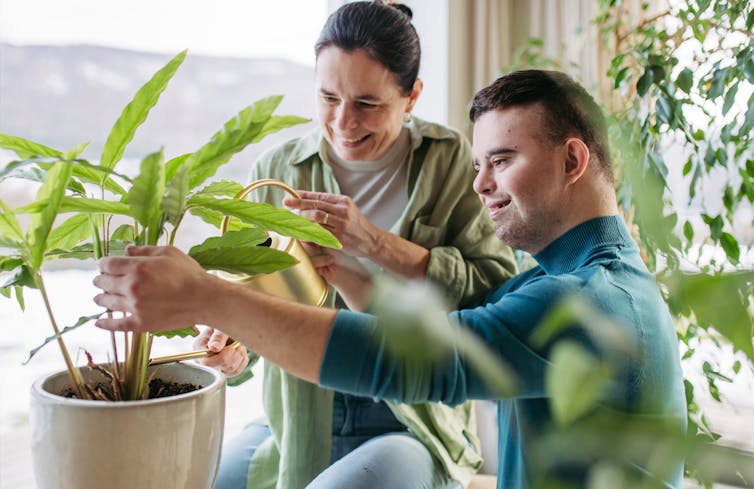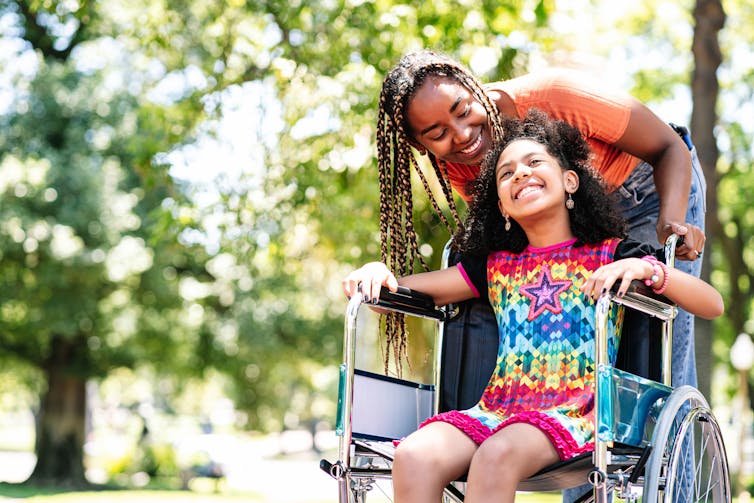Governments Must Ensure Caregivers Have Support
Happy National Caregiver Day in Canada yesterday! Let's make supporting caregivers a key public policy issue in our current federal election and link it to economic recovery from economic challenges! We need CARE SECURITY in our country and that comes from the natural caring in families. We can't keep it up without support. I co-authored the article below with Dr. Heather Aldersey, Associate Professor at Queen's University in Kingston, Ontario.

Heather Aldersey, Queen's University, Ontario
April 1 marks National Caregivers Day in Canada. The day is meant to recognize the carers who provide vital care and support to those in need.
We all need care and support to navigate challenges in life. Help can come from formal support (paid professionals and government programs), and from natural support networks (family, friends and neighbours).
People with disabilities and their families often have an even greater need for support over time, especially if a disability is progressive or family members experience their own health challenges due to aging.
The Canadian Centre for Caregiving Excellence (CCCE), a program of the Azrieli Foundation, released its National Caregiving Strategy on Feb. 18, stating that caregiving is the next frontier in Canadian public policy. As the CCCE’s executive director, Liv Mendelsohn, said: “Millions of Canadians are navigating caregiving with minimal support, and it’s simply unacceptable.”
This article’s co-author, Donna Thomson, is a caregiver, author and educator. She is the mother of two grown children, one who has severe cerebral palsy and medical complexity. Thomson also helped care for her mother who lived with dementia until she passed away in the summer of 2018 at the age of 96.
Family caregivers often need support themselves in order to keep working both inside and outside of the home. Parents of adult children with developmental disabilities in Canada are hardly ever asked: “What do you do for your son or daughter that paid helpers cannot?” Even less often, that question might be followed by: “Wow, that’s a lot. Would you like some support to continue doing those things?”

Importance of natural caregivers
Our research recognizes that both formal and informal supports are essential in enabling people with disabilities and their families to live their best lives. We want to understand how individuals, families, organizations and communities can best come together to get people with disabilities and their families the types of supports they need and want, when they need and want them.
Over the course of our research, we conducted a document and literature review, alongside interviews and focus groups with people with disabilities, family members and formal disability support providers. We identified that family or friend caregivers often support a person they care for with a sense of love and commitment to a depth that is rare in formal support relationships.
Unbound by professional obligations, safety standards or employer/funder priorities, these natural supporters can often be vocal advocates for the best interests of those they are supporting.
However, sometimes finding and sustaining natural support in the community doesn’t come easily for people with disabilities and their families. In those instances, organizations and facilitators (formal supports), can help broker the creation and maintenance of natural support networks.
Community organizations offering formal supports and supporting the creation and maintenance of natural supports can sometimes be beholden to funder obligations. This can limit the flexibility and adaptability required to best meet the needs of those they support.
Additionally, organizations are often constrained by safety considerations, aversion to risk or the challenges posed by overly bureaucratic systems. Sometimes, this can mean the support provided to a person or family does not directly respond to what the individual or family needs. Even more frustrating is that waiting times can be so long to access formal supports that identified needs or priorities change in the meantime.

CCCE’s caregiving strategy
The CCCE strategy is a recognition that care work makes all other work possible. It echoes our research findings that both paid and unpaid caregivers need financial support as well as targeted programs and services.
The strategy calls upon the Canadian government to make caregiving a priority while ensuring a sustainable care provider workforce.
Supports are also a provincial issue. For example, in Ontario, the Ministry for Children, Community and Social Services has published a framework that offers a long-term vision for transforming developmental services so people with developmental disabilities fully participate in their communities and are supported to live their lives.
Care and support can also be a gender issue, given that in Canada and around the world the majority of both formal and informal support is being provided by women and girls.
Missing perspectives
Our research also highlighted a notable gap in the research landscape. Research on natural support in Canada is often not explicit about or does not incorporate understandings of natural support from the perspectives of Indigenous, Black, rural, LGBTQ+ and other marginalized groups.
People belonging to these groups may have their own needs and experiences that relate to navigating natural and formal support systems in Canada. Future-focused research agendas into natural supports, such as those proposed in the CCCE strategy’s recommendations, must intentionally seek to understand support and care experiences from these perspectives.
At the Global Disability Summit taking place this week in Berlin from April 2-3, we will join voices from around the world to call on national leaders and decision-makers to ensure disability policies translate into tangible actions and inclusive practices.
Our research shows the deep, important impact of federal and provincial policy and funding both for formal and natural supports to flourish. With a federal election on the horizon, Canadians can call on their governments to improve support for caregivers, ensure support systems are in place and flexible enough to respond to individual and family needs, and enable natural support networks to flourish.
This is important, because the care we give to each other, regardless of age or ability, is what will sustain us as families.
This article was co-authored by Donna Thomson, a caregiver, author and educator.![]()
Heather Aldersey, Professor and Canada Research Chair (Disability Inclusive Development), Queen's University, Ontario
This article is republished from The Conversation under a Creative Commons license. Read the original article.







